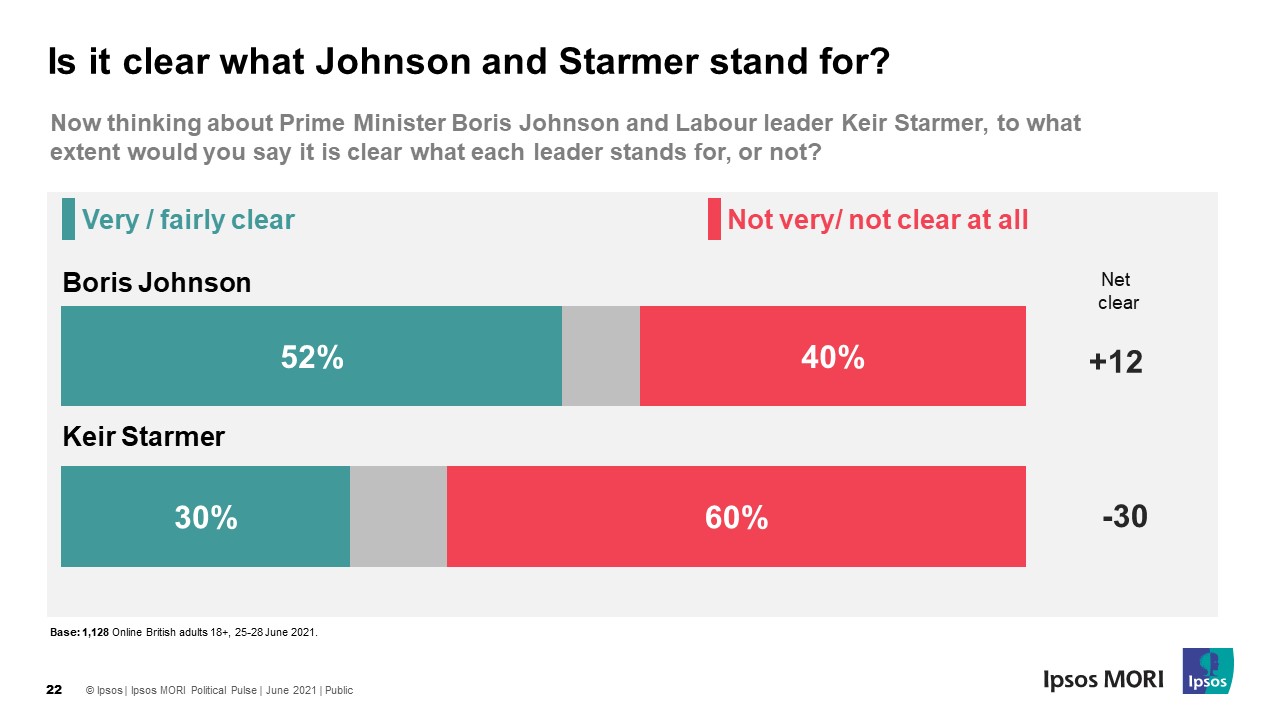Ahead of Batley and Spen by-election 6 in 10 Britons think it is unclear what Labour leader Keir Starmer stands for
New polling from Ipsos’s Political Pulse series, taken over the weekend of the 25th -28th June shows:
- Just 30% of Britons say it is very clear or fairly clear what Keir Starmer stands for. 60% think it is not very clear or not clear at all– including two in five (41%) 2019 Labour voters.
- 52% think it is clear what Prime Minister Boris Johnson stands for – including 79% of 2019 Conservative voters. 40% of Britons overall think it is unclear.
- Favourability towards Johnson and the Conservative Party has fallen since May – but just 1 in 4 Britons think Labour under Starmer would do a better job in government.

Are things in Britain heading in the right or wrong direction?
- 40% of Britons think the country is heading in the wrong direction (+6 pts from May), 35% think things are heading in the right direction (-12) The.net rating on this measure falls from +13 to -5 since May. The worst net rating since January this year.
How favourable are the public towards the parties and leading politicians?
- As we may expect, public favourability towards Matt Hancock has fallen sharply. 17% of Britons are favourable towards the former Health Secretary (-14 pts since May) and 56% unfavourable (+20 pts). His net rating now stands at -39 rather than -5 in May.
- Interestingly, favourability towards Boris Johnson and the Conservative Party also fall to figures not seen since January and February this year.
- 33% of Britons are favourable towards Boris Johnson this month (-7 pts from May), 47% are unfavourable (+7 pts). Net favourability falls from zero in May to -14 this month.
- Overall 31% of Britons are favourable towards the Conservative Party (-5 pts from May). 45% are unfavourable (+6 pts). Net favourability towards the party has fallen to -14 this month from -3 in May.
- However, falling popularity for Johnson and the Conservatives is not followed by rising support for Starmer and Labour. For both, numbers are largely unchanged.
- For Keir Starmer, just one in five Britons are favourable towards the Labour leader (20%, -1 pt from May). 45% are unfavourable (+2 pts). His net favourable ratings virtually unchanged at -25 compared to -22 in May.
- For the Labour Party a similar story is told. 25% of Britons are favourable towards the Labour Party (-2 pts from May) and 45% are unfavourable (+3 pts). Net favourability towards the party stands at -20 now rather than -15 in May.
Are the Conservatives doing well in government? Would Labour do better?
- 32% think the current Conservative government, led by Boris Johnson, is doing well at running the country. 44% say it is doing badly. 21% have no opinion. 3% don’t know.
- However, when asked whether a Labour government, led by Keir Starmer, would do any better just one in four (26%) think it would do a better job, 36% think it would do worse and 27% say it would make no difference. 11% don’t know.
Impact of leaving the EU
- Meanwhile 32% think the UK decision to leave the EU has had a positive impact on the country (-4 pts from May). 44% say negative (+3 pts).
Commenting on the findings, Ipsos Director of Politics Keiran Pedley said:
It will concern Keir Starmer and his supporters that 6 in 10 Britons are unclear what he stands for. Meanwhile, at a time when favourability towards Johnson and the Conservatives appears to have fallen, it is striking that just one in four Britons think Labour would do a better job in government. In this context, whispers about Starmer’s leadership may well grow louder if Labour lose the Batley and Spen by-election this week.
Technical note
Ipsos interviewed a representative sample of 1,128 British adults aged 18+. Interviews were conducted online from 25th and 28th June 2021. Data are weighted to match the profile of the population. All polls are subject to a wide range of potential sources of error.




